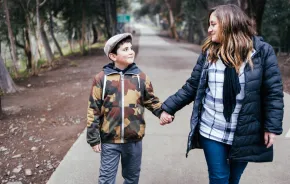
Editor's note: This content was previously published in "Psychology Today" in October 2018 and is reprinted with permission here.
Despite a half-dozen reminders, multiple timers and a bunch of heads-up, when it’s time for her daughter to get off her device and come to the dinner table, Charlotte finds herself in the same power struggle she’s been through hundreds of times before. (Okay, it just feels like hundreds.)
Can you relate?
When these kinds of conflicts come up, it’s all too easy to react out of frustration. And that’s bound to escalate things even further.
So, instead of reacting, we want to pause, untangle our emotions and look for the learning opportunity in this challenging situation (because there always is one).
To be fair, it’s not easy to do this while in the moment, but it’s absolutely worth it if we can. Responding in this way helps everyone get back to calm more quickly, creates space for the development of skills and deepens our relationship with our kids.
Turn challenges into an opportunity for connection and growth
The next time you find yourself in a power struggle or conflict with your child, especially one in which you’re stuck in a negative loop, consider these five questions:
1. What is it in this situation that you are making about you?
If we are triggered by our child’s behavior, it’s almost always because we’re making their choice mean something about us and how good (or bad) we are as a parent. When we have a strong emotional reaction to something our child is doing, we need to ask ourselves: What am I making this mean?
She doesn’t respect me. She shouldn’t be ignoring me. She doesn’t care about our shared agreement.
2. How does the challenge highlight your child’s undeveloped skills or abilities?
By realizing our child’s behavior is simply the result of their lack of skills, the situation stops being personal. Instead, it becomes a chance to better see our child for who they are right now and to identify areas for future growth. So, what is the challenge revealing about your child?
She struggles with predicting how much time certain tasks take. She has a hard time when people place demands on her. She has a tough time leaving a task half-finished.
3. What can your child learn from the challenge or situation?
Absolutely every challenge with our child presents an opportunity for developing nascent skills. It’s important that we give ourselves time to pinpoint the opportunity for growth in the situation and to consider ways to reframe the challenge. Where is the learning opportunity?
She can learn that when she respectfully communicates her needs, she’ll not only avoid conflict, but she can be part of a solution that feels so much better for everyone.
4: What can you learn about yourself through this challenge or situation?
Every time we focus on, reflect and reframe these difficult moments, we learn more about our own personal triggers and increase our own emotional IQ. How can I grow through this situation?
Being ignored by my child is really challenging for me, but when I remember to pause and process before responding, we can actually shorten the conflict.
5. How can your connection with your child deepen as a result of the challenge?
Going through this inquiry process and responding with more empathy, respect and validation helps us come out on the other side of a conflict feeling even more deeply connected to our child. How might our relationship grow closer through this?
When we remember we’re on the same side and work together to come up with a solution, we always feel more connected than ever.












